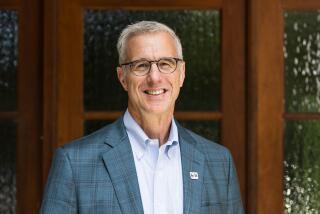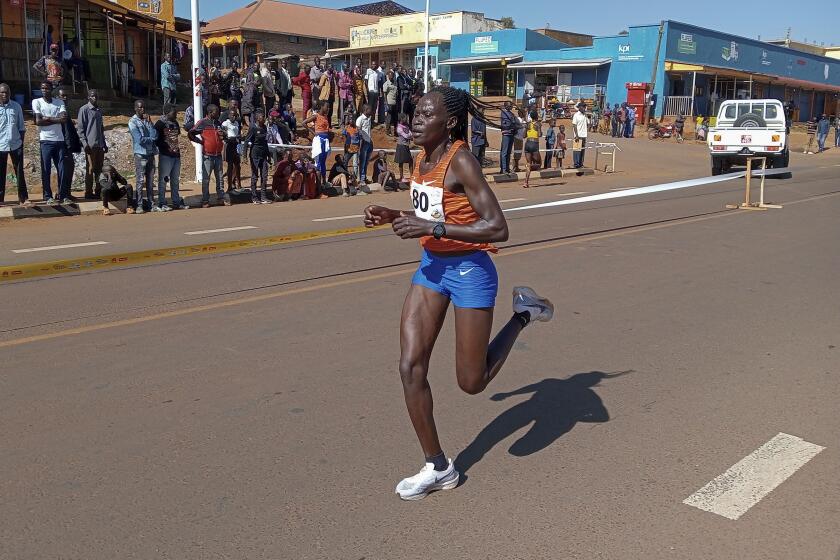Leaders: Put Movement Ahead of Helmick : Olympics: Heads of governing bodies under Olympic umbrella want to put USOC president’s predicament in the past.
Wednesday’s announcement that U.S. Olympic Committee President Robert H. Helmick will resign was greeted with sadness, disappointment and a sense of relief by some leaders of America’s Olympic sports organizations.
A handful of national governing body executive directors called Helmick an important figure in the growth of the U.S. Olympic movement. But most accepted the fact that the beleaguered USOC chief needed to resign in the wake of reports regarding his private business dealings that could represent a conflict of interest.
“The organization has become a business (under Helmick),” said Jim Fox, executive director of U.S. Boxing.
Jerry Lace, executive director of the U.S. Cycling Federation, summarized the officials’ mixed emotions by crediting Helmick’s tenure in advancing the Olympic movement, but citing concerns over the allegations.
“If Bob resigned because there was a conflict of interest on his part, that might be better for the organization,” Lace said.
Said Chuck Cale, chief executive officer of the USA World Cup ’94 organizing committee, a USOC special assistant and a member of the USOC’s audit, ethics and financial impact committee:
“I’ve known Bob for a long time. I’m sure he created lines in his own mind over which he would not step. I can’t see anything he has done that justifies the pillorying that has occurred. Even if you assume he used questionable judgment, it’s clear to me that what he has been subjected to isn’t justified. There are serial murderers who have gotten one-tenth the play (news reports) that he has.”
Because of the media scrutiny, some officials said they hoped the controversy would die with the resignation. Baaron Pittenger, executive director of USA Hockey and a one-time USOC executive director, said Olympic leaders have a responsibility to stay away from such conflicts.
“The image that the organization portrays to the American public is predominant in anything we do,” boxing’s Fox said.
None of the officials interviewed said that losing Helmick will hinder the USOC or efforts in fund-raising. No one speculated as to what effect the resignation will have on the governing bodies, even though the USOC is a major sponsor for almost all of the groups. The USOC funds as much as 70% to 90% of the budgets for some governing bodies.
Lace, the cycling director, said the organizations will be able to skirt the controversy because each acts autonomously from the parent group.
“When we want to act independently, we can,” he said, implying that the groups can distance themselves from the USOC in fund-raising efforts.
Ray Essick of United States Swimming, Inc., said: “The Olympic movement can stand on its own merits. It will survive. It has a greater meaning than an individual.”
While most of the leaders were considering who will be the next president, Howard Peterson of U.S. Skiing in Park City, Utah, was emphasizing other issues.
Tuesday, Peterson and two other ski federation colleagues sent an open letter to the USOC executive committee demanding the resignation of Helmick and Harvey Schiller, the USOC’s executive director.
Peterson, whose group receives 6% of its budget from USOC funds, said Wednesday that he hopes Helmick’s decision to resign will not mean the end to discussions of USOC improprieties.
“We were very concerned that it is not just Bob Helmick, but the broader issues being addressed and dealt with if substantial progress is to be made,” he said. “For some of us who have had contact over the years, it is a pretty sad point for Bob, personally. But it would be sadder if the result was a forced resignation of Helmick without going to the root of the problems.”
Peterson indicated improprieties deal with three or four other members of the executive committee, but he would not name them.
“I personally believe Bob contributed a lot,” Peterson said. “He brought a lot of positive aspects by taking some unpopular positions that were productive for the athletic movement.
“For this to have all eroded and degenerated where this kind of thing can happen, it goes far beyond Bob.”
But Helmick, 54, a sports law attorney from Iowa, was the focus of Wednesday’s discussions.
Although most praised his administrative work with the Olympics, those interviewed were ready to move on.
Times staff writers Julie Cart, Randy Harvey and Theresa Munoz contributed to this story.
More to Read
Go beyond the scoreboard
Get the latest on L.A.'s teams in the daily Sports Report newsletter.
You may occasionally receive promotional content from the Los Angeles Times.







